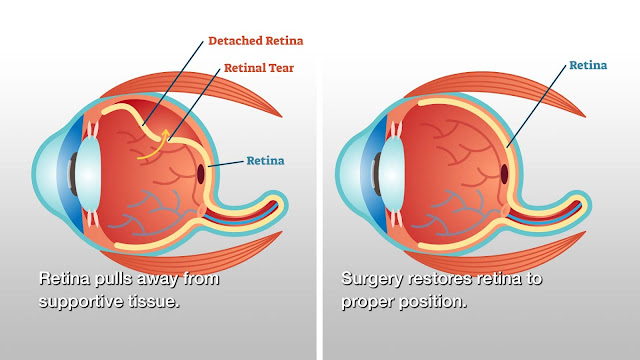What Causes Retinal Detachment in Adults
Today we're going to discuss what causes retinal detachment in young adults? We will also touch on what a retinal detachment actually is and the symptoms associated with this condition.
Types of Retinal Detachment
Today we're going to touch on one of two types of retinal detachments.
We are going to talk about rhegmatogenous that means the detachment causes which is either by a retinal hole or retinal tear.
The hole or tear allows the fluid from the middle of the eye to form underneath the retina. Therefore if fluid accumulates underneath the retina through this hole or tears the retina Detaches.
Keep in mind that a retinal detachment is potentially blinding so there is some urgency to try and fix this ASAP.
Symptoms of a retinal detachment include loss of your peripheral vision and usually the peripheral or the side vision is involved first, and the loss of vision moves centrally.
Flashes and Floaters
Flashes and floaters are also commonly associated with a retinal detachment because those are usually signs of a retinal tear. The recommendations are that new flashes and new floaters should be discussed with your doctor and your doctor should be looking for retinal tear because it's their job to try and prevent you from getting a retinal detachment if they can diagnose a retinal tear early.
Dilating Pupils
So what should you do if you think you're having a retinal detachment. I recommend you let your own eye doctor know that you're having these new symptoms. You may need to get your pupils dilated by dilating your pupils your doctor can directly examine your retina and if he diagnoses you with a retinal detachment you're going to need surgery.
Types of Treatment
Unfortunately, there aren't any drops or medicines to fix a retinal detachment, now there are ways or three methods to fix a retinal detachment the first is called a pneumatic retina Peck, the second is an operation called a scleral buckle and the third is an operation called a vitrectomy.
Pneumatic Retina Peck
Pneumatic retina Peck involves the injection of gas into your eye the gas is used as a tool to help reattach your retina with a pneumatic retina peck depending on the location of the tear.
You may have to hold your head in a certain position this is sometimes face down keeping your head straight up or to the right or to the left, again it depends on the location of the tear.
A pneumatic retina Peck can be done in the GP's office and can be very effective at fixing retinal detachments a second way to fix a retinal detachment is with a scleral buckle.
Scleral Buckle
Scleral buckle involves placing a silicone band or rubber around the outside of your eye, don't worry it will be completely unnoticed once you've healed up its intended to stay there it's a very effective way to repair a retinal detachment and has been around for several generations.
It does require surgery and most common complication of scleral buckle surgery is the increase in nearsightedness after the operation because your eye is actually made slightly longer.
Vitrectomy
A third way to fix a retinal detachment is with vitrectomy, remember scleral buckle involves placing an element or a rubber piece of rubber around the outside of your eye and going inside the eye to remove the vitreous and the fluid underneath the retina.
Sometimes gas is also put in the eye at the end of the operation and just like pneumatic retina you may have to hold your head in a certain position.
So there are three ways to fix a retinal detachment either with pneumatic retina pecs, buckle, or vitrectomy.
Now sometimes your surgeon may decide to combine both the screen or buckle and vitrectomy and that's really a personal preference and all surgeons have different indications as for when to perform both.
The timing of retinal detachment surgery is really dependent upon whether or not the macula which is the functional center of your retina is threatened another way.
What's the chance of you losing your central vision
Again this is an urgent situation, but not an emergency situation, probably the only time where retinal detachment surgery is an emergency is when you still have 20/20 vision that is your central vision is intact but your doctor feels that if the retinal detachment were to enlarge your central vision might be in jeopardy.
Summary
So to summarize we've talked about retinal detachments and those are retinal detachments that involve a hole or tear in the retina we talked about symptoms of retinal detachments new onset flashes, the onset of floaters or loss of your peripheral vision, we touched on surgery the three options are pneumatic retina Peck see scleral buckle and or vitrectomy.
We also touched on about the timing of surgery it's all dependent on whether or not your central vision or your macula is involved. So now you are that much more knowledgeable about this disease you will be well prepared should it arise.



